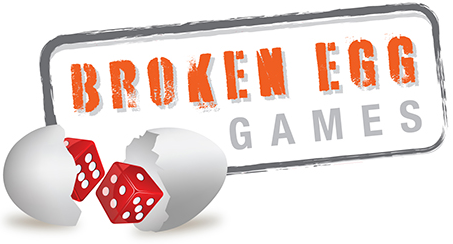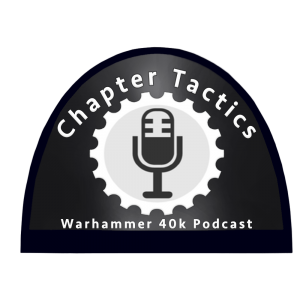Chapter Tactics is a 40k podcast which focuses on promoting better tactical play and situational awareness across all variations of the game. Today PeteyPab grabs two LVO judges to talk about dealing with cheaters at 40k tournaments, and the guys go over their BAO lists and reflect on the meta challenges ahead.

Show Notes:
- Our Sponsor the Iron Halo put out a promo video! Check it out!
- Don’t forget to check out our new sponsor! Broken Egg Games.
- Click here for a link for information on downloading best coast pairings app where you can find lists for most of the events I mention.
- Check out the last episode of Chapter Tactics here. Or, click here for a link to a full archive of all of my episodes.
- Want more tactical information about the new edition? Check out our 8th Edition article archive to help get a leg up on the competition!
- Commercial music by Music by: www.bensound.com
- Intro by: Justin Mahar


Need help with a list idea? Got a rules question? Want to talk tactics? Then email me at…
frontlinegamingpeteypab@gmail.com
Please do not send an army list in a format such as Army Builder, send them in an easy to read, typed format. Thanks!



Kudos for pointing out how Chess Clocks are (more and more often, now that they become more common) gamed against you in a variety of ways.
Barely a week ago, Reece and abusepuppy were adamant about this basically never happening and being a non-issue and, to quote, “I think you will be hard-pressed to find any significant number of people stateside who feel it is an issue of note”.
With chess clocks becoming more common and arguably the norm, I can very well see “actively gaming the chess clock” to be a major, major source of frustration for a lot of people at these events, especially in those “mid-table-odd-match-ups” you mentioned.
Uh… I don’t think that’s what anyone said, though. Knowing how the clock works, and how to play under it effectively isn’t the same thing as “gaming it,” nor is it in any way inherently negative. It was just an admonition to players who had zero experience with using the clock that it is a different sort of experience, and one they should be ready for.
I don’t think chess clocks are as necessary for the mid-table players, not because they won’t benefit from it (finishing games is good for everyone), but because their games simply won’t be relevant to who wins the tournament, pure and simple.
Games not finishing are _already_ the norm for a lot of players. Chess clocks solve that problem. You take issue with that, but I haven’t seen a better solution yet.
It sounded like it was just the one issue? (opponent trying to distract you during your turn.) And Pablo suggested a solution to that one issue. Also an opponent can already try to distract you during any non-chess clock game?
Sure. And I listed a few other issues.
Of course an opponent can distract without a chess clock, and of course you can sanction intentional slow-play without a chess clock too.
Point is, ITC want’s to regulate slow play with chess clocks despite insisting repeatedly that cheating through (intentional) slow play is rare and acknowledging that other options also exist. So why not treat the potential downsides to chess clocks (of course also rare and potentially also available to “cheaters” without chess clocks, if less easily) the same way and write a set of chess clock rules that both aides players against potential slow players AND against potential chess-clock-abuse-cheaters? (Both being presumably rare, if the podcast is something to go by and both types of rules being, often as not, a help for players to “ref their own game” rather than something that will be the basis of highly public top-table rulings)?
I think everyone has admitted that it would be _possible_ to abuse the clock, just like it is possible to abuse any system. But as far as I can tell, all of your objections to chess clocks are essentially theoretical at this point, because none of them are actually things anyone other than you has seen at a tournament.
If you feel that the problems are going to be noticable and prevalent, what _specific_ changes do you think need to be made to the clock rules to solve those problems? What concrete and particular issues do you feel the ITC’s current system does not address?
Uh… isn’t this the prev. ep. description?
Fixed! Thanks for the heads up.
Many of the issues covered seem to develop from the lack of a set of rules for tournaments. The ones I attend follow the GW Warhammer World rules, so WYSIWYG is very much at the front of every-ones thinking. If you’re going to use a Forge World model, then it had better be that model not a home-made conversion.
So too is dropping points down to 1750. Then calling a referee to resolve issues referred to in this podcast.
Slow play (aka running out the clock) is definitely a competitive move that needs rules in place to counter.
It happens in all kinds of competition where rules permit it.
I remember a trivia competition in HS where my team stormed ahead to a major lead and we only had 5 min left before the end. The teacher said points were doubled lets go! The only chance the other team had was to rack up the score quickly so I started buzzing in to answer every question and simply stayed silent wasting time until teacher moved on. There was no penalty for not answering.
It happens in the NFL too where teams get very conservative and run the ball to keep the clock ticking down.
I think chess clocks are a great start and players need to be on alert for attempts to game the clock system.
Your advise to simply hand over rules and say find it yourself is a good start.
I personally think more rules, guidance and pro-active judging is needed because the stereotype for tabletop gamers is more on the passive side and aggressive gamers can bully their way to competitive advantages when their opponent remains silent on shady issues.
What a complete dick move that was. You must be popular at parties
I agree what I did was a dick move.
I did it at the time b/c I thought it was a dick move by the teacher to double the points and give the other team a chance to catch up.
But 2 wrongs don’t make a right.
It is better to make rules preventing those types of situation than hope people in a competitive setting will behave themselves.
That is why I shared the story.
The scale of cheating->WAAC->try hard->casual is a developing issue for the hobby right now with all the tournament “scandals” breaking.
My example was probably between somewhere between WAAC and try hard. But if the goal for growing 40k is to approach it like an ambassador for the game we probably want to put the limit on behavior somewhere between try hard and casual instead.
I don’t think you’re a dick Agent X. I also don’t think it’s a dick move to use the current rules to your advantage.
Which is why I think there should be rules surrounding chess clocks in the “floor rules” that ITC is putting together. Such as in actual chess where you can’t hit the timer with a different hand then the one you played the last piece as an example.
Also, I don’t think intentional slow play is super common. I also think intentional FAST play is less common than it should be. Chess clocks (and a rule set surrounding them) encourage the latter which is really where we need to be to complete full games.
I mean, i think that is built into football. the “clock” here is the turn. 40k is designed to be done in 5 turns. just like football is “60min” so its a good example of where slow playing is part of the game. and where it isnt. Also they do have time rules or else they get downs. They HAVE to run the ball or throw incomplete passes. they cant just sit on the time.
I understand your argument but disagree with your view of the clock in football.
There are rules that impact the clock and provide for the total time to play but ultimately the “clock” is a variable to be fought over in football. The time of possession (TOP) battle is commonly discussed during games. The teams don’t get equal time. The “clock” in the game can be manipulated and is asymmetrical.
40K with no chess clock has the same asymmetric problem and a player can tailor an army to play and win short games (glass cannon burst damage all CPs spent in turn 1/2 etc.). They then burn up time with stalling tactics etc. And although the game is designed to go 5 turns the play time clock can be manipulated to prevent that from happening (unlike football where a game will go the full length subject to rules etc.)
The chess clock mechanic is objectively fair. Time is now symmetrical and each player is guaranteed the same amount of time. How they choose to use that time is now in their control (notable exceptions TBD as raised by Zweischneid’s concerns above).
As a new system we can expect people in a competitive setting to find the loopholes and probe the boundaries of what is acceptable/possible. It will help the growing pains if the floor rules address some of these potential conflicts in advance.
That is pretty much what i was saying. the clock isnt their to give people equal time in football. but chess clocks arent there to be gamed in 40k
A note on heroic intervention:
‘After the enemy has completed all of their charge moves…’
It can be argued that if no charges are made in the charge phase, then heroic intervention cannot be used (I personally don’t think it should be this way, but as we don’t have an FAQ on it, it should be noted that how heroic intervention works needs deciding by TOs, or agreed by players)
Hey Gordon, I understand the logic behind that line of thinking. It’s wrong. Anyone who tries to argue that “all” is 1 or more charge moves just can’t win that debate. I understand that there may have to be an FAQ on the matter, but I think it is clear as day RAW.
YOu’re right though, it ultimately is up to the judges and TOs to give a ruling and uphold it throughout the day.
Unfortunately, many (enough for there to be a reasonable disagreement) from my side of the Atlantic are on the restrictive side on this one.
That was the interpretation I had played by for a while, but the last several tournaments I’ve gone to the TOs have ruled the opposite (that not making any charge moves is still “completing all their charge moves”), so the tide seems to be against it.
The phase still occurs, so I would read it as yes you do. However, we can ask up the food chain.
And the counterargument to that is that heroic intervention says “after the opponent has finished their charge moves,” not “at the end of the charge phase.” There is always a charge phase and a fight phase, but there are not always charge moves or fights.
*shrug* But at the end of the day, it’s the TO’s call. I just don’t think it’s as absolute and clear-cut as a lot of people are trying to make it out to be.
After Pablos description of Reece I just imagine him showing up to a GT like the ETC with big ass sunglasses and a blind mans cane pretending to not know whats going on.
Great episode guys. I hope TOS don’t start ruling against legitimately purchased GW products just because they’re smaller than new versions. Instead of saying you can’t play with old negash for example as mentioned on the podcast just make sure you have the right base size but also can’t we just allow people to Target them based on the new model height/size? I hope we don’t start forcing people to rebuy things…
Wow, I just made a comment saying almost exactly the same thing before I glanced up and saw this. Fully agree. Shutting down official GW purchases is when the cheating paranoia is getting too much.
I don’t comment because I usually agree with everything you guys say… but I think once you start accusing people who brought their official GW model that they payed for into a 40 game, of “modelling for advantage”, you’ve crossed a line into absurdity. Telling people to rebuy the models that they already owned, have purchased officially, and have played with just fine for years after years… Lord of Change is $200 in my country, telling people “well you’ve had ample time to rebuy it!” is just garbage. The older I get the more responsibilities I have and the less recreational funds I find myself having, what if I can’t afford to drop that kind of money rebuying units I already own? Even if I could, that’s a lot of money to most people… I play a single army and it’s taken me decades of VERY slow collecting to be able to get to a decent size army, trying to tell me my models have cycled out like it’s MTG standard set is nonsense, and goes against everything this hobby is about imo. Shutting down modelling for advantage is one thing – but if someone has an OFFICIAL MODEL for the unit, then you have to change your dimension restrictions to reflect that, not the other way around.